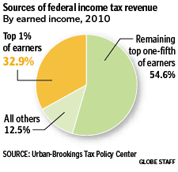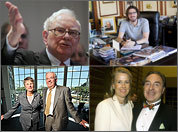From some of the richest, two cheers for higher taxes
Bill Cummings hasn’t spoken with Warren Buffett since last month, but he agrees with the billionaire investor’s recent call for wealthy Americans - Cummings included - to help reduce the country’s deficit by paying more taxes.
Increasing taxes for the rich won’t make a huge dent in the $14 trillion debt, according to Cummings, but the symbolism matters.
“It serves to set an example that some people who can well afford to pay more are paying more,’’ said Cummings, a local developer and founder of the Cummings Foundation, one of the largest philanthropic organizations in Massachusetts.
The issue of whether to make the wealthy contribute more in taxes has been at the forefront of partisan sniping over what to do about the swelling US deficit. President Obama and many Democrats argue that budget cuts should be accompanied by tax increases for people who can afford to contribute more. Republicans, however, remain opposed to any deficit-lowering deal that includes higher taxes.
The top 1 percent of taxpayers already finance a big part of the cost of running the government - paying nearly a third of federal individual income tax revenue, according to the Urban-Brookings Tax Policy Center in Washington.
But in a New York Times opinion piece last Sunday, Buffett - chairman of giant holding company Berkshire Hathaway Inc. - maintained that it’s not enough. He proposed raising taxes for US households with annual incomes exceeding $1 million - roughly 236,000 in 2009, according to the Internal Revenue Service - and slapping an additional increase on the 8,200 households making $10 million or more.
Cummings said he and his wife, Joyce, are willing to do their part. The Winchester couple have not disclosed their net worth, but they have promised 90 percent of their wealth to charity through the Giving Pledge, a philanthropic campaign targeted at billionaires, and started by Buffett and Bill and Melinda Gates.
“Why have funds and not do something with them?’’ Cummings said of Buffett’s proposal for higher taxes.
Jack Manning, chief executive of the real estate finance company Boston Capital Corp., said he “largely’’ agrees with Buffett. If more tax revenue is needed to tame the deficit, he said, it should come only from those with deep resources.
“The concept of taxing the middle class right now . . . this is not the right time to do that because these people don’t have big savings accounts and don’t have a lot to fall back on,’’ said Manning.
Manning, whose income puts him in the highest federal income tax bracket - 35 percent - said he would be willing to pay at the 39.5 percent rate assessed during the Clinton administration, but later reduced under President George W. Bush.
But another local businessman - whose net worth has been estimated at nearly half a billion dollars - is less enthusiastic about Buffett’s “more taxes’’ campaign.
“On a singular level, I would say no,’’ said John Fish, chief executive of Suffolk Construction in Boston. “If it’s not connected to an overall strategy and an overall plan that would help America get back on its feet, it doesn’t make sense.’’
Economists differ on whether taxes on the rich should be raised, and many are skeptical about the impact the additional revenue would have on the debt.
“There are not that many super-rich,’’ said Jeffrey Miron, a senior lecturer of economics at Harvard University and a senior fellow at the Cato Institute, a libertarian public policy research organization in Washington.
Miron believes a “broad part of the country’’ would accept some higher taxes if any increases were accompanied by other changes to the tax code, along with sensible cuts in Medicaid, Social Security, and defense spending.
Alan Viard, a resident scholar at the American Enterprise Institute, a conservative policy group in Washington, said additional taxes on the extremely wealthy will probably be part of whatever fiscal agreement politicians finally hash out. As part of the deal to raise the debt ceiling, a congressional super committee has been charged with producing a bipartisan deficit-reduction plan by November.
“If a grand solution is reached, it has got to include that, politically,’’ Viard said of tax increases, but “it would be a mistake to try to close the fiscal imbalance solely by taxing the rich.’’
Such an approach might cause affluent households to save less, inhibiting investment and long-term economic growth. If Congress decides to increase taxes on the rich, Viard said, one way to do it would be to restrict itemized deductions on people in upper-income brackets.
Local auto dealership owner Ernie Boch Jr., who defines his net worth as “over a million’’ but is certainly worth much more, said he would be willing to write a bigger check to the government if he could be assured that higher payments would make a difference. He doesn’t sound optimistic about that happening.
“If the US was a business, it would be a failing business,’’ Boch said. “That’s the problem. You have to spend less than you make. Business 101.’’
Erin Ailworth can be reached at eailworth@globe.com or on Twitter @ailworth. ![]()


